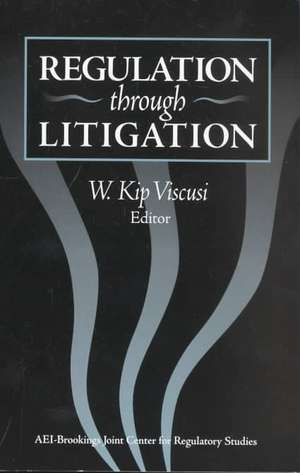Regulation through Litigation
Editat de W. Kip Viscusien Limba Engleză Paperback – 24 iul 2002
Recent high-profile lawsuits involving cigarettes, guns, breast implants, and other products have created new frictions between litigation and regulation. Increasingly, litigation is being used as a financial lever to force companies to accept negotiated regulatory policies—policies that invariably involve less public input and accountability than those arising from government regulation. The process not only usurps the traditional governmental authority for regulation, but also shifts the locus of establishing tax policy from the legislature to the parties involved in the litigation. Citizen interests are not explicitly represented and there is no mechanism to ensure that these outcomes are in society's best interests. By focusing on case studies involving the tobacco industry, guns, lead paint, breast implants, and health maintenance organizations, the contributors to this volume collectively shed light on the likely consequences of regulation through litigation for insurance markets and society at large. They analyze the ramifications of large-scale lawsuits, mass torts, and class actions for the insurance market, and advocate increased public scrutiny of attorney reimbursement and a competitive bidding process for all lawsuits involving government entities as the plaintiffs.
Preț: 235.76 lei
Nou
Puncte Express: 354
Preț estimativ în valută:
45.11€ • 47.23$ • 37.33£
45.11€ • 47.23$ • 37.33£
Carte tipărită la comandă
Livrare economică 07-21 aprilie
Preluare comenzi: 021 569.72.76
Specificații
ISBN-13: 9780815706090
ISBN-10: 081570609X
Pagini: 369
Dimensiuni: 152 x 229 x 26 mm
Greutate: 0.51 kg
Editura: Brookings Institution Press
Colecția Brookings Institution Press and AEI
ISBN-10: 081570609X
Pagini: 369
Dimensiuni: 152 x 229 x 26 mm
Greutate: 0.51 kg
Editura: Brookings Institution Press
Colecția Brookings Institution Press and AEI
Notă biografică
W. Kip Viscusi is John F. Cogan Jr. Professor of Law and Economics and director of the Program on Empirical Legal Studies at Harvard Law School.
Descriere
A Brookings Institution Press and American Enterprise Institute publication
Recent high-profile lawsuits involving cigarettes, guns, breast implants, and other products have created new frictions between litigation and regulation. Increasingly, litigation is being used as a financial lever to force companies to accept negotiated regulatory policies—policies that invariably involve less public input and accountability than those arising from government regulation. The process not only usurps the traditional governmental authority for regulation, but also shifts the locus of establishing tax policy from the legislature to the parties involved in the litigation. Citizen interests are not explicitly represented and there is no mechanism to ensure that these outcomes are in society's best interests.
By focusing on case studies involving the tobacco industry, guns, lead paint, breast implants, and health maintenance organizations, the contributors to this volume collectively shed light on the likely consequences of regulation through litigation for insurance markets and society at large. They analyze the ramifications of large-scale lawsuits, mass torts, and class actions for the insurance market, and advocate increased public scrutiny of attorney reimbursement and a competitive bidding process for all lawsuits involving government entities as the plaintiffs.
Recent high-profile lawsuits involving cigarettes, guns, breast implants, and other products have created new frictions between litigation and regulation. Increasingly, litigation is being used as a financial lever to force companies to accept negotiated regulatory policies—policies that invariably involve less public input and accountability than those arising from government regulation. The process not only usurps the traditional governmental authority for regulation, but also shifts the locus of establishing tax policy from the legislature to the parties involved in the litigation. Citizen interests are not explicitly represented and there is no mechanism to ensure that these outcomes are in society's best interests.
By focusing on case studies involving the tobacco industry, guns, lead paint, breast implants, and health maintenance organizations, the contributors to this volume collectively shed light on the likely consequences of regulation through litigation for insurance markets and society at large. They analyze the ramifications of large-scale lawsuits, mass torts, and class actions for the insurance market, and advocate increased public scrutiny of attorney reimbursement and a competitive bidding process for all lawsuits involving government entities as the plaintiffs.















